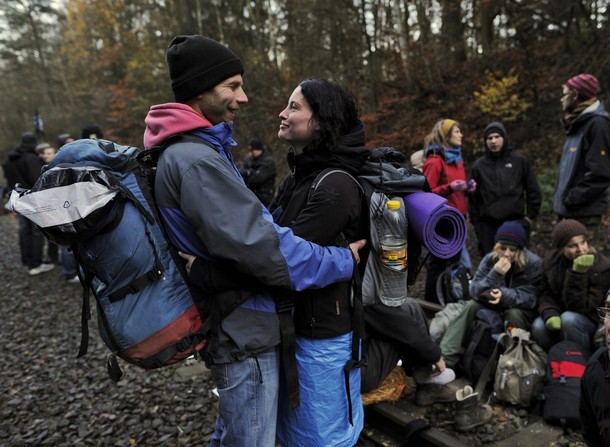
Two anti nuclear protestors against the Castor transport and storage of nuclear waste share a light moment during a blockade near Harlingen on November 7, 2010. Police clashed with activists trying to halt a train carrying nuclear waste from France to Germany as protests against the shipment turned increasingly violent. AFP PHOTO/ODD ANDERSEN
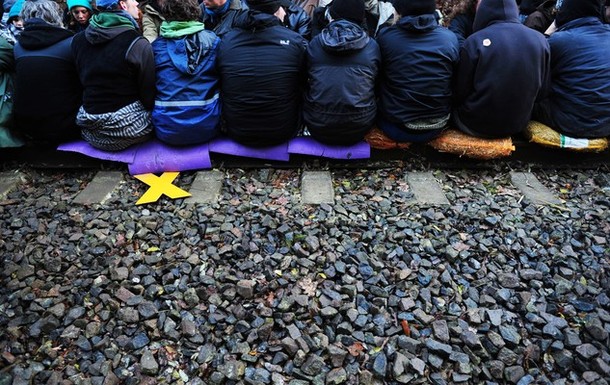
Anti nuclear protestors take part in a blockade of the train tracks near Harlingen on November 7, 2010. Police clashed with activists trying to halt a train carrying nuclear waste from France to Germany as protests against the shipment turned increasingly violent. AFP PHOTO / JOHANNES EISELE
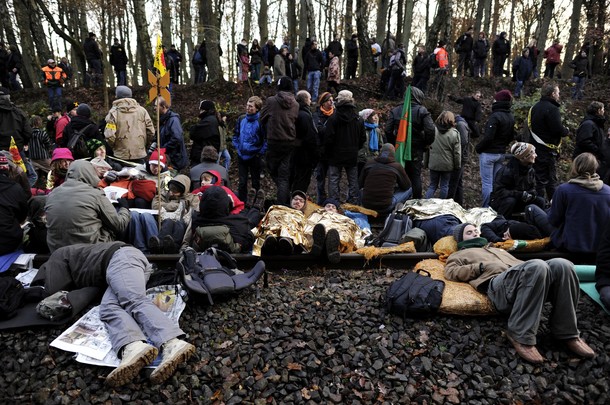
Anti nuclear protestors against the Castor transport and storage of nuclear waste sleep and rest on the tracks during a blockade near Harlingen on November 7, 2010. Police clashed with activists trying to halt a train carrying nuclear waste from France to Germany as protests against the shipment turned increasingly violent. AFP PHOTO/ODD ANDERSEN
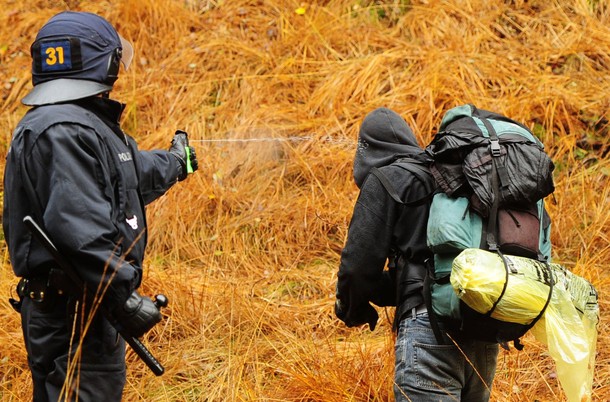
A police officer uses pepper spray on a protestor next to the train tracks on November 7, 2010 near in Metzingen near Gorleben. Protests are underway against the Castor transport of nuclear waste to the storage facility in a salt deposit in Gorleben taking place this weekend. AFP PHOTO / JOHANNES EISELE
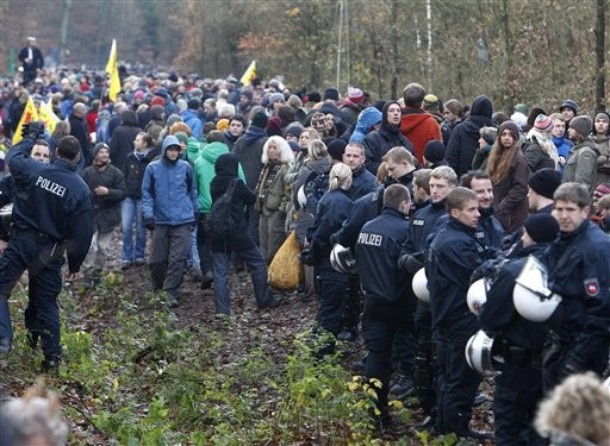
Hundreds of anti nuclear protesters block the track near Hitzacker, northern Germany, Sunday, Nov. 7, 2010. Activists rappelled down from a high bridge, broke through police lines and chained themselves to German train tracks Sunday, trying to halt a shipment of nuclear waste as they protested Chancellor Angela Merkel's plans to keep using nuclear energy. (AP Photo/Michael Probst)
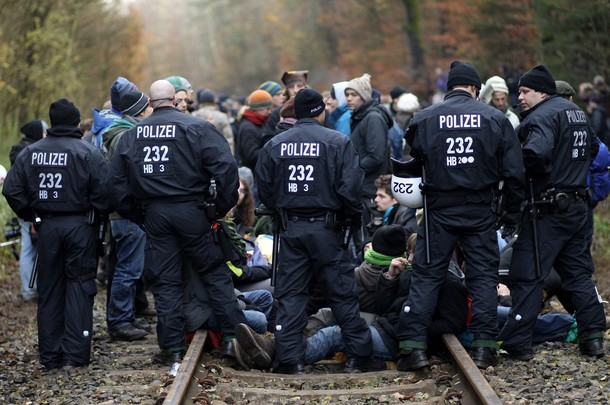
PUSSARDE, GERMANY - NOVEMBER 07: Police men stand guard next to anti-nuclear activists of the group "Widersetzen" blocking the railtracks the nuclear waste transport is going to use on November 7, 2010 in Pussarde, Germany. More then 3000 activists will try to stop the ongoing nuclear waste convoy to the storage facility in a salt deposit in Gorleben. (Photo by Miguel Villagran/Getty Images)
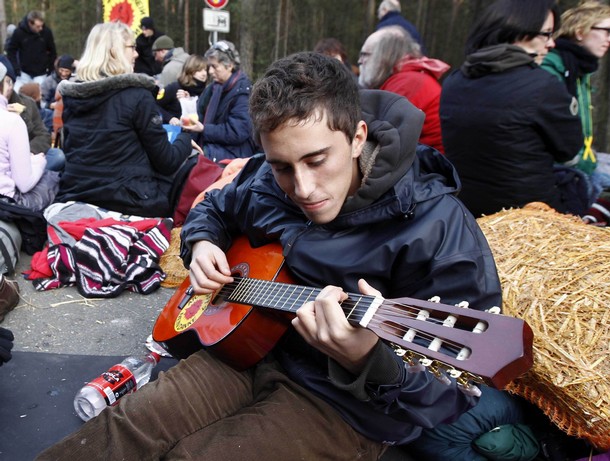
An anti-nuclear protester plays guitar as he sits on the main road to Germany's interim nuclear waste storage facility during a blockade in the northern German village of Gorleben November 7, 2010. German police clashed on Sunday with anti-nuclear activists trying to disrupt a shipment of Castor rail containers of reprocessed German nuclear waste to a storage dump, using truncheons and tear gas to clear a blocked rail line. REUTERS/Fabrizio Bensch
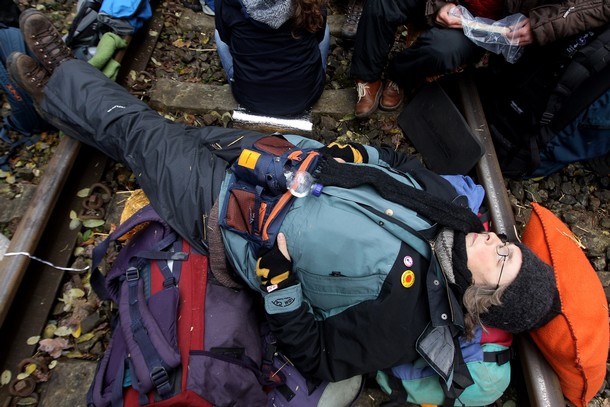
PUSSARDE, GERMANY - NOVEMBER 07: An anti-nuclear activist of the group "Widersetzen" rests on the railtracks the nuclear waste transport is going to use on November 7, 2010 in Pussarde, Germany. More then 3000 activists will try to stop the ongoing nuclear waste convoy to the storage facility in a salt deposit in Gorleben. (Photo by Miguel Villagran/Getty Images)
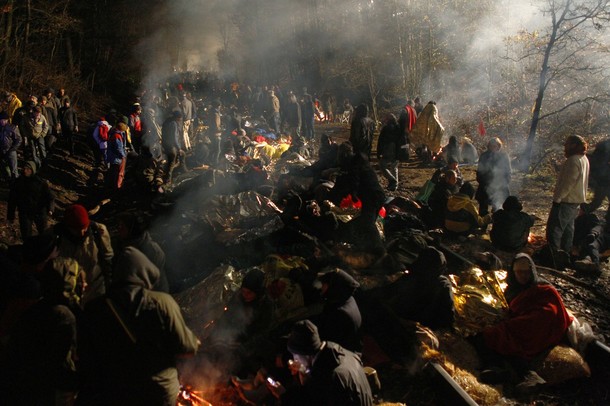
Anti-nuclear protestors block the railway tracks in Pussade between Lueneburg and Dannenber November 7, 2010. German police clashed on Sunday with anti-nuclear activists trying to disrupt a shipment of Castor rail containers of reprocessed German nuclear waste to a storage dump, using truncheons and tear gas to clear a blocked rail line. REUTERS/Pawel Kopczynski
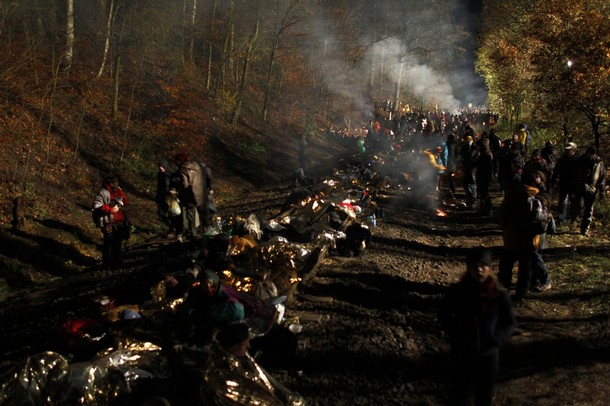
Anti-nuclear protestors block the railway tracks in Pussade between Lueneburg and Dannenber November 7, 2010. German police clashed on Sunday with anti-nuclear activists trying to disrupt a shipment of Castor rail containers of reprocessed German nuclear waste to a storage dump, using truncheons and tear gas to clear a blocked rail line. REUTERS/Pawel Kopczynski
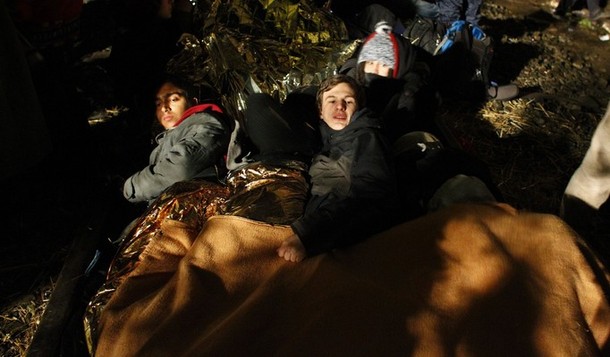
Anti-nuclear protestors block the railway tracks in Pussade between Lueneburg and Dannenber November 7, 2010. German police clashed on Sunday with anti-nuclear activists trying to disrupt a shipment of Castor rail containers of reprocessed German nuclear waste to a storage dump, using truncheons and tear gas to clear a blocked rail line. REUTERS/Pawel Kopczynski
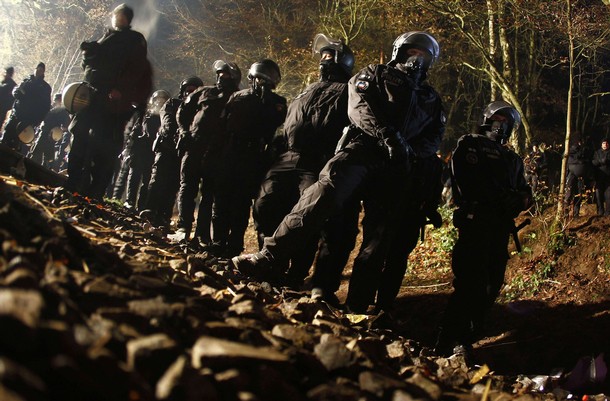
German riot police wait in line before they remove hundreds of anti-nuclear activists from the railway tracks in Harlingen near Dannenberg November 8, 2010. German police detained about 800 protesters who refused to leave the tracks after more than 3,000 protesters blocked the tracks on Sunday disrupting a shipment of eleven Castor rail containers of reprocessed German nuclear waste to the storage dump in Gorleben. REUTERS/Kai Pfaffenbach
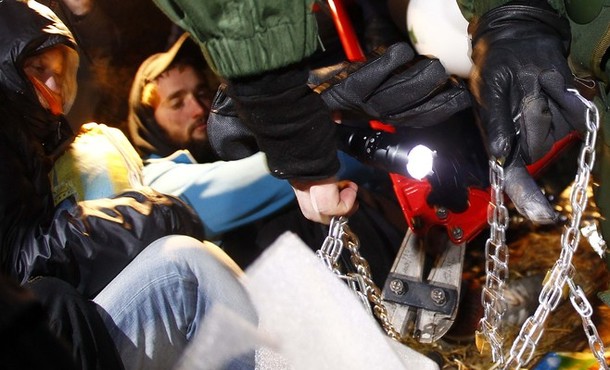
German riot police cut the chains used by anti-nuclear activists to block the railway tracks in Harlingen near Dannenberg November 8, 2010. German police detained about 800 protesters who refused to leave the tracks after more than 3,000 protesters blocked the tracks on Sunday disrupting a shipment of eleven Castor rail containers of reprocessed German nuclear waste to the storage dump in Gorleben. REUTERS/Kai Pfaffenbach
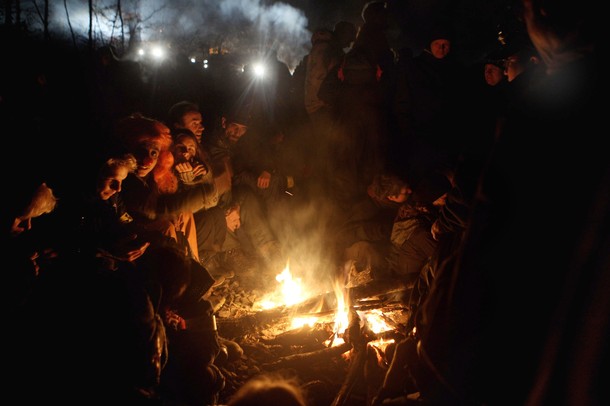
PUSSARDE, GERMANY - NOVEMBER 07: Anti-nuclear activists of the group "Widersetzen" sit around a fire as they blockade the railtracks the nuclear waste transport is scheduled to travel on November 7, 2010 in Pussarde, Germany. More than 3000 activists will try to stop the ongoing nuclear waste convoy to the storage facility in a salt deposit in Gorleben. (Photo by Miguel Villagran/Getty Images)
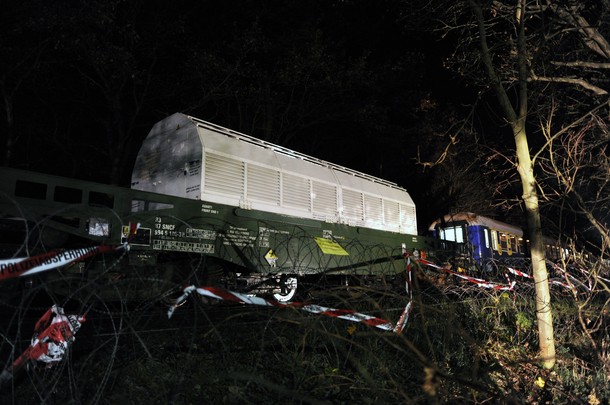
A train carrying nuclear waste from France to Germany sits late on November 7, 2010 at Dahlenburg station, some 25 kms from its final destination as thousands of anti-nuclear protestors against the transport and storage of nuclear waste blocked the track a few kilometers away. The train carrying 123 tons of nuclear waste, dubbed by activists "the most radioactive ever", was to loaded onto lorries at Dannenberg for transfer to the nearby storage facility of Gorleben, in northern Germany. AFP PHOTO / ODD ANDERSEN
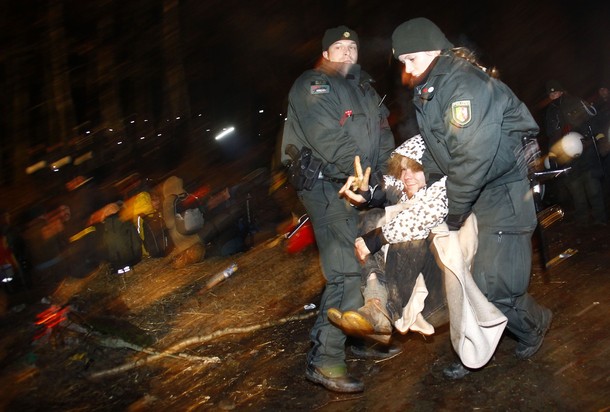
German riot police remove hundreds of anti-nuclear activists from the railway tracks in Harlingen near Dannenberg November 8, 2010. German police detained about 800 protesters who refused to leave the tracks after more than 3,000 protesters blocked the tracks on Sunday disrupting a shipment of eleven Castor rail containers of reprocessed German nuclear waste to the storage dump in Gorleben. REUTERS/Kai Pfaffenbach
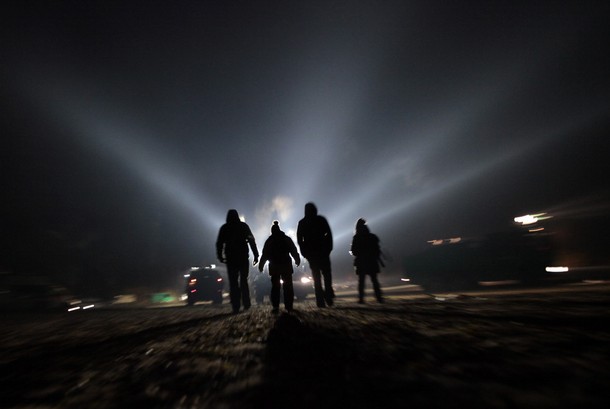
Anti-nuclear activists walk through a field after choosing to leave following protest action on railway tracks in Harlingen near Dannenberg November 8, 2010. German police detained about 800 protesters who refused to leave the tracks after more than 3,000 protestors blocked the tracks on Sunday disrupting a shipment of eleven Castor rail containers of reprocessed German nuclear waste to the storage dump in Gorleben. REUTERS/Christian Charisius
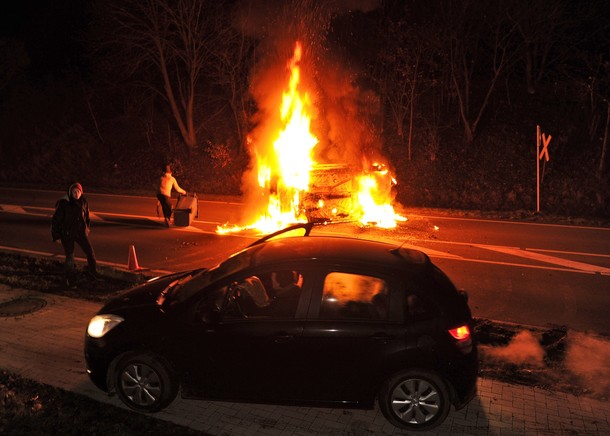
Anti-nuclear protestors against the transport of nuclear waste from France to Germany use a burning vehicle as part of a barricade during protest in Metzingen on November 7, 2010. A train carrying the 123 tons of nuclear waste, dubbed by activists "the most radioactive ever", was loaded onto lorries at Dannenberg for transfer to the nearby storage facility of Gorleben, in northern Germany. AFP PHOTO / ODD ANDERSEN
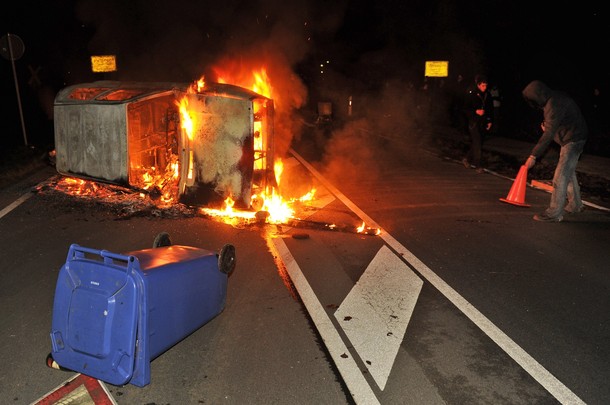
Anti-nuclear protestors against the transport of nuclear waste from France to Germany use a burning vehicle as part of a barricade during protest in Metzingen on November 7, 2010. A train carrying the 123 tons of nuclear waste, dubbed by activists "the most radioactive ever", was loaded onto lorries at Dannenberg for transfer to the nearby storage facility of Gorleben, in central Germany. AFP PHOTO / ODD ANDERSEN
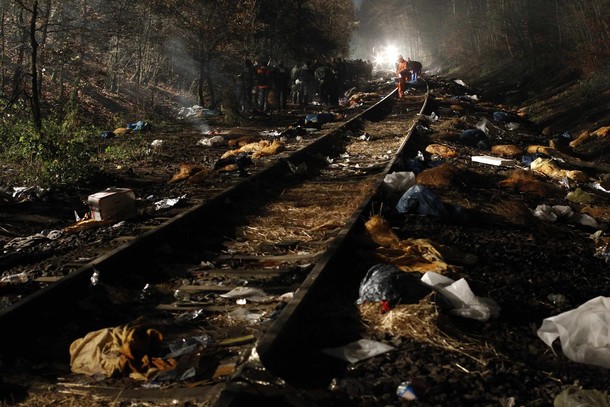
Railway workers and German police officers stand along railway tracks full of waste after police removed anti-nuclear activists from the tracks in Harlingen near Dannenberg November 8, 2010. German police detained about 800 protesters who refused to leave the tracks after more than 3,000 protestors blocked the tracks on Sunday disrupting a shipment of eleven Castor rail containers of reprocessed German nuclear waste to the storage dump in Gorleben. REUTERS/Christian Charisius
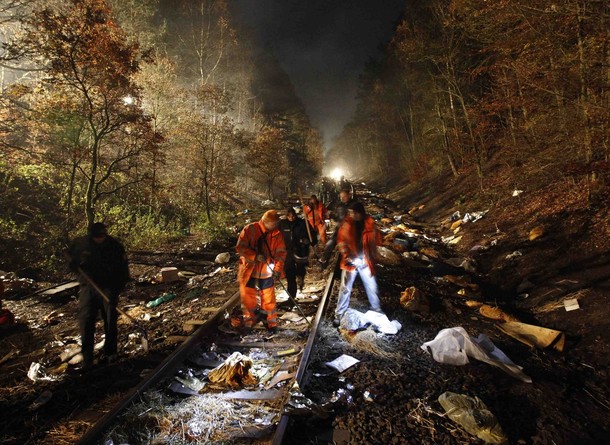
Railway workers remove waste and check the railway tracks after an anti-nuclear protest in Harlingen near Dannenberg November 8, 2010. German police detained about 800 protesters who refused to leave the tracks after more than 3,000 protestors blocked the tracks on Sunday disrupting a shipment of eleven Castor rail containers of reprocessed German nuclear waste to the storage dump in Gorleben. REUTERS/Christian Charisius
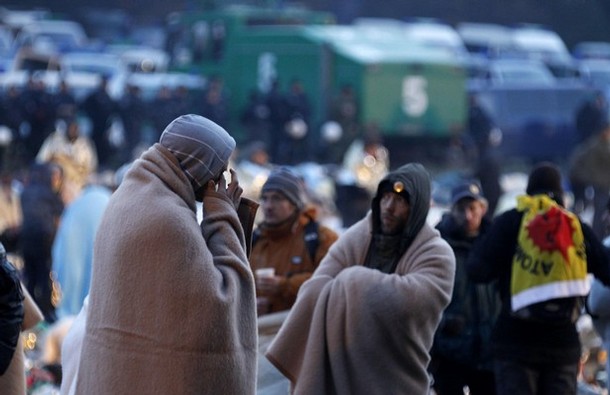
Hundreds of confined anti-nuclear activists wait in a camp to be released by German riot police after being detained for blocking the railway tracks in Harlingen near Dannenberg November 8, 2010. German police detained about 800 protesters who refused to leave the tracks after more than 3,000 protesters blocked the tracks on Sunday disrupting a shipment of eleven Castor rail containers of reprocessed German nuclear waste to the storage dump in Gorleben. REUTERS/Kai Pfaffenbach
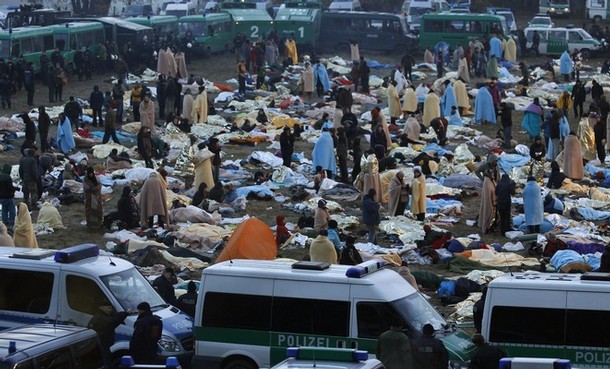
Hundreds of detained anti-nuclear activists wait in a camp to be released by German riot police after being detained for blocking the railway tracks in Harlingen near Dannenberg November 8, 2010. German police detained about 800 protesters who refused to leave the tracks after more than 3,000 protesters blocked the tracks on Sunday disrupting a shipment of eleven Castor rail containers of reprocessed German nuclear waste to the storage dump in Gorleben. REUTERS/Kai Pfaffenbach
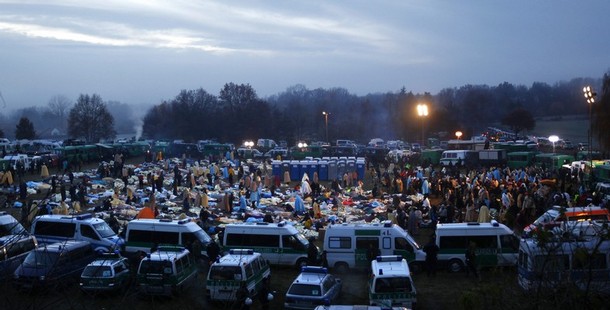
Hundreds of detained anti-nuclear activists wait in a camp to be released by German riot police after being detained for blocking the railway tracks in Harlingen near Dannenberg November 8, 2010. German police detained about 800 protesters who refused to leave the tracks after more than 3,000 protesters blocked the tracks on Sunday disrupting a shipment of eleven Castor rail containers of reprocessed German nuclear waste to the storage dump in Gorleben. REUTERS/Kai Pfaffenbach
